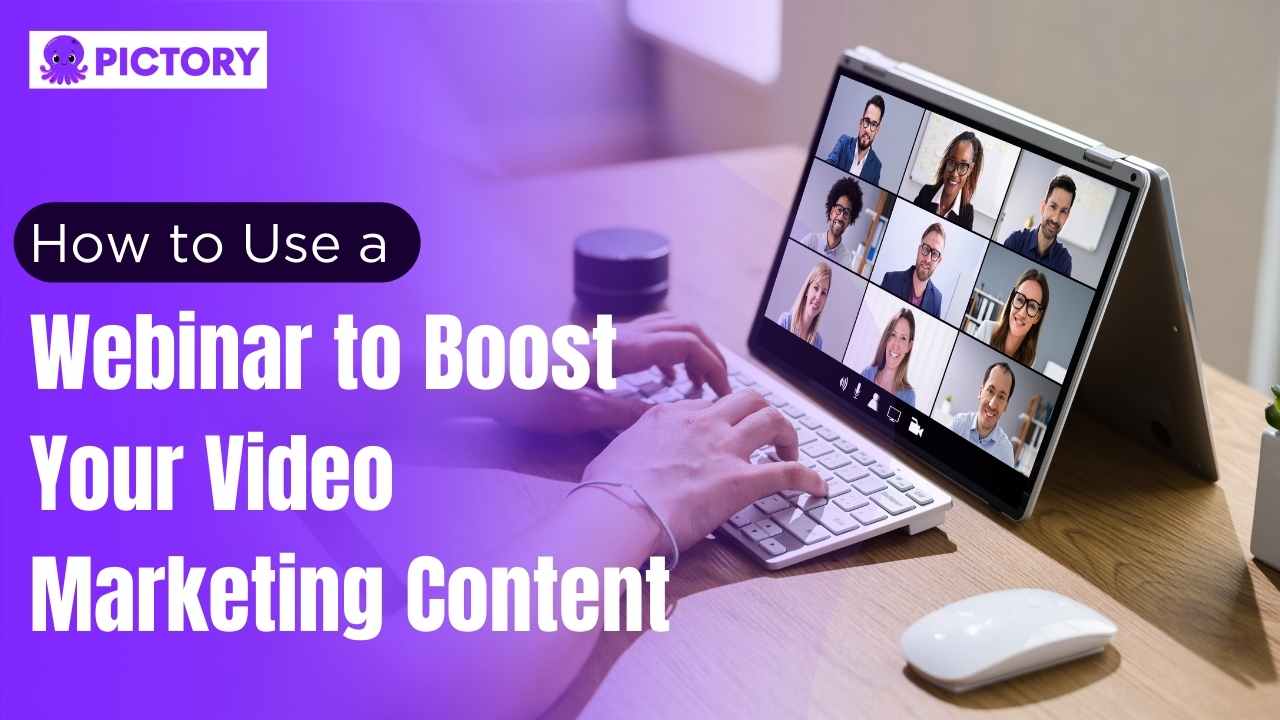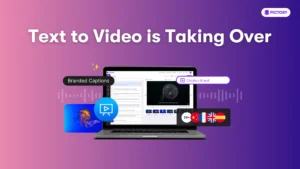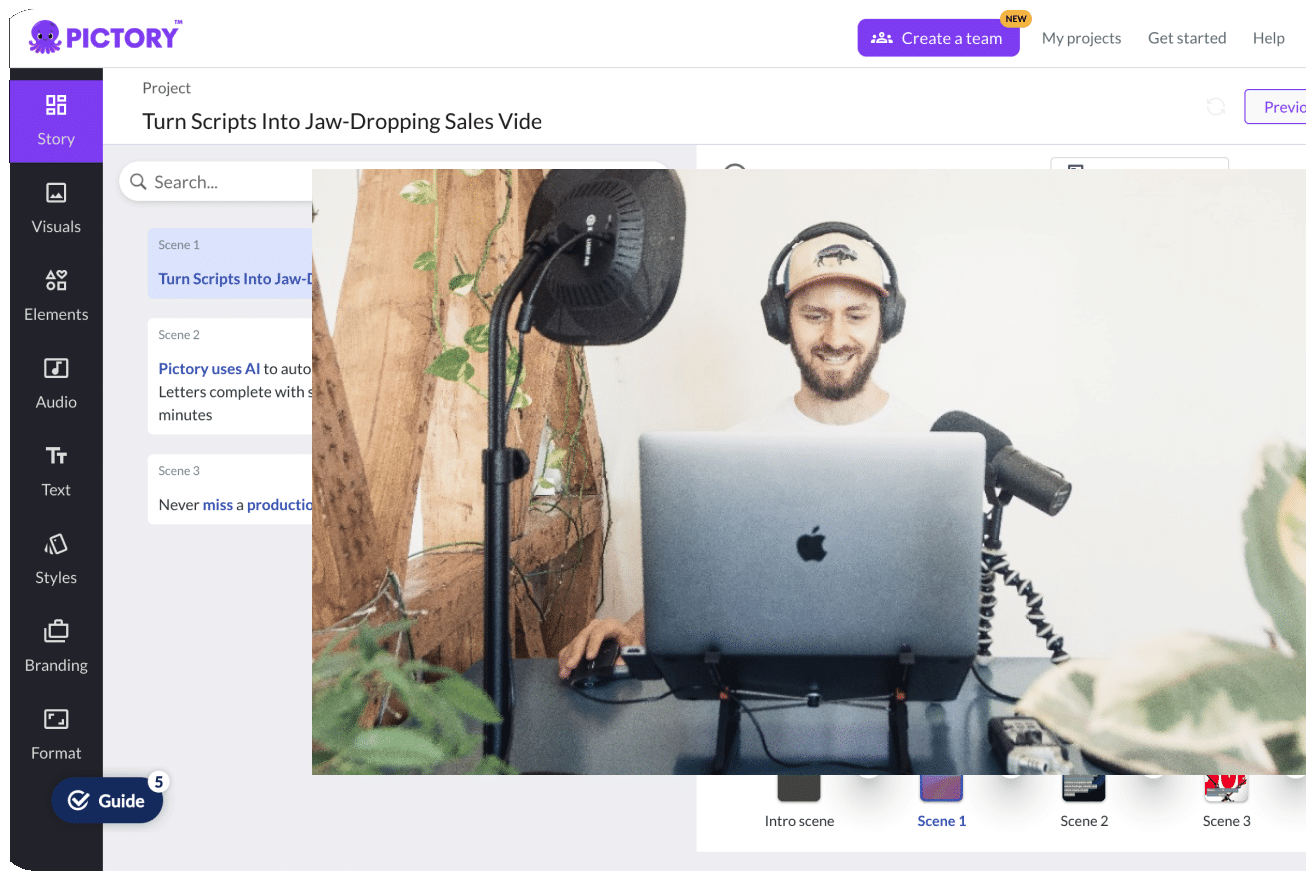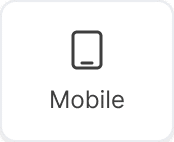How can you use a webinar to boost your overall video content marketing strategy and results?
And why should you even bother with this approach?
Well, for starters, 5-20% of webinar attendees can immediately be turned into buyers.
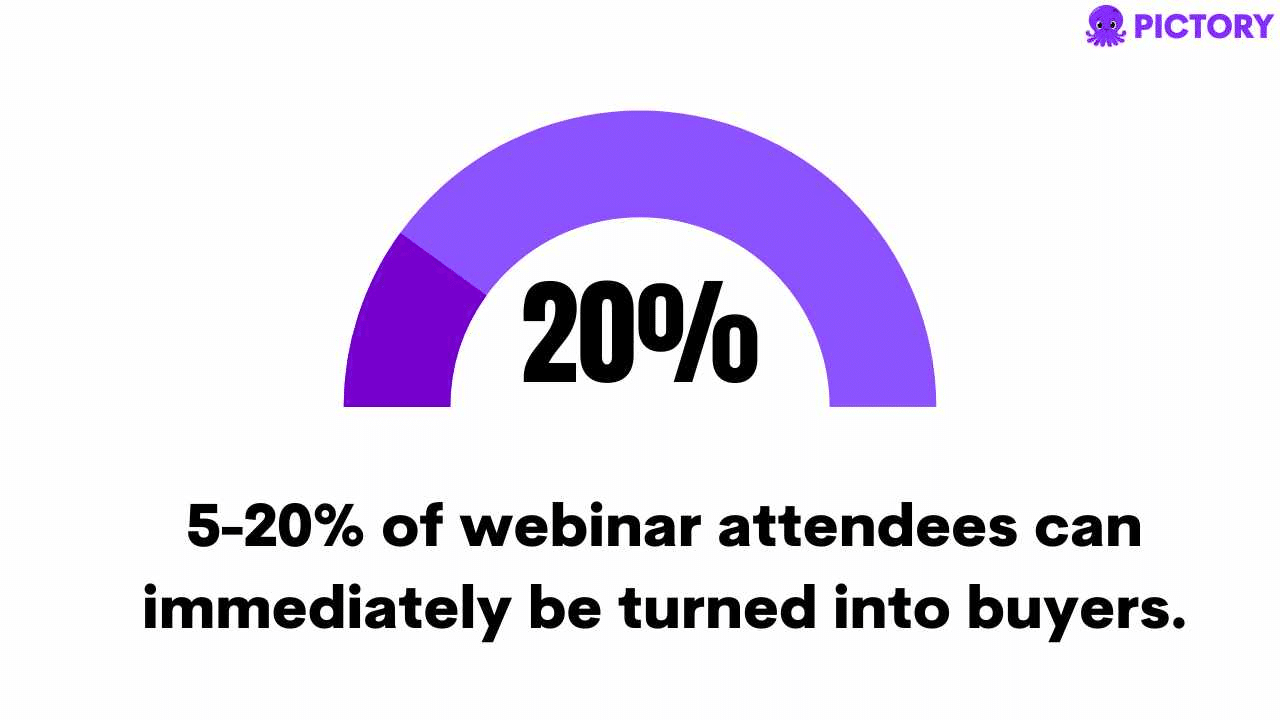
Webinars have become a popular tool for businesses to connect with their target audience, fostering a sense of brand loyalty and community, without large digital marketing budgets.
Discover how you can use Pictory’s AI video generator and editor to position your brand as a thought leader and create marketing content that will generate leads for your business.
TL;DR
Webinar content has evolved from educational seminars to a versatile marketing strategy, offering formats like panel discussions, Q&A, presentations, interviews, and product demonstrations.
Webinars facilitate thought leadership, lead generation, and relationship building, becoming integral to digital marketing.
Choose the right webinar topic and format that can present you as a voice of authority on a subject
It should align with your broader content marketing goals, ideally selling your product or service, but also providing additional insight and value for viewers.AI tools can help craft your webinar: AI writers can help with structuring and scripting, and an online video editor like Pictory can quickly craft promotional materials.
Keep the audience engaged during the live webinar with dedicated audience interactive segments, such as discussions and Q&As to bring more value to your content.
Repurpose your webinar content across channels using Pictory to create highlight snippets, extending the reach of your content.
Understanding Webinar Marketing
Webinars exploded in popularity during the pandemic as in-person events and conferences came to a halt.
They became a vital way for organizations to continue thought leadership, product launches, training, and more.
But what exactly is webinar marketing, and how does it fit into your broader strategy?
What is Webinar Marketing?
Webinars began solely educationally, as online seminars, created so that students from around the world could attend the same lecture in real time.
Today, webinars have evolved into a robust marketing tool for all manners of businesses and their digital or email marketing strategies.
Webinar marketing refers to hosting live, virtual events using specialized web conferencing software to market a tool or product solution.
They allow real-time interaction between the host and the audience, giving an extra personal touch to a marketing campaign.
As a medium, webinars are highly flexible.
Some examples of webinar formats include:
Panel discussions – Assemble 3-5 industry experts for a lively discussion.
A moderator usually guides this type of conversation.
Thanks to the diverse panel, you can showcase diverse views.Q&A sessions – Your product team answers attendees’ questions live.
It allows two-way interaction, which is fantastic for engagement.
It’s best to have pre-planned questions ready as well.Single-speaker presentations – In this webinar format, one speaker presents slides and materials.
It’s a simple format but comes with a risk of disengagement because of its one-sided nature.Interviews – Interview an influencer or loyal customers about their experience.
It provides an outside perspective of your product/service, adding credibility to your brand image.Product demonstrations – Showcase your product’s features and capabilities through a live demo.
It’s a great way to announce what you’re working on to the world.
The Evolution and Importance of Webinars
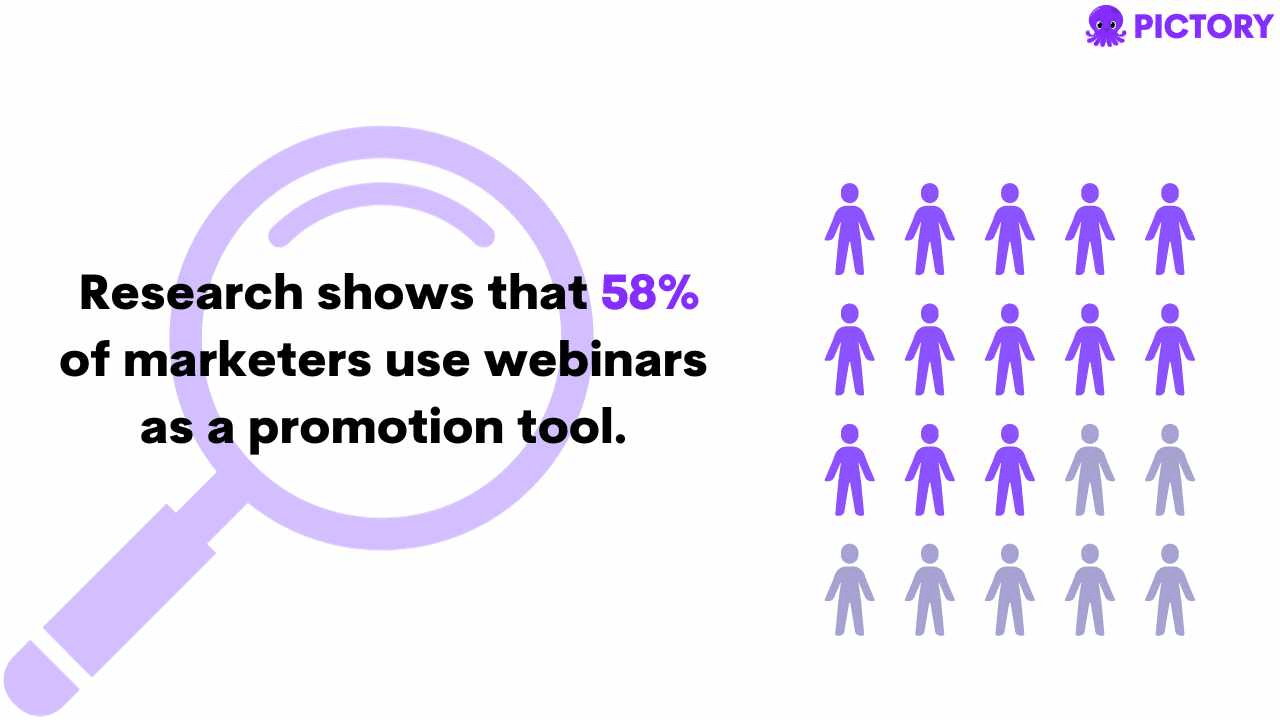
Webinars position your brand as a thought leader.
They allow you to generate and nurture leads through valuable content.
Use them to fill content gaps by complementing your other efforts.
Most companies weave webinars into their overall content strategy and calendar instead of using them as one-off events.
Webinars are also amazing for lead generation.
That’s because in many cases a registration page exists to gate access to webinars.
In such cases, viewers must register on a landing page before they can attend.
For example, they have to give their email address and company name when they register.
This is valuable information you can use later for lead nurturing and email marketing automation.
Overall, webinars allow you to captivate niche audiences.
And you are sure to demonstrate expertise and build virtual relationships along the way.
The Technical Foundations of an Amazing Webinar
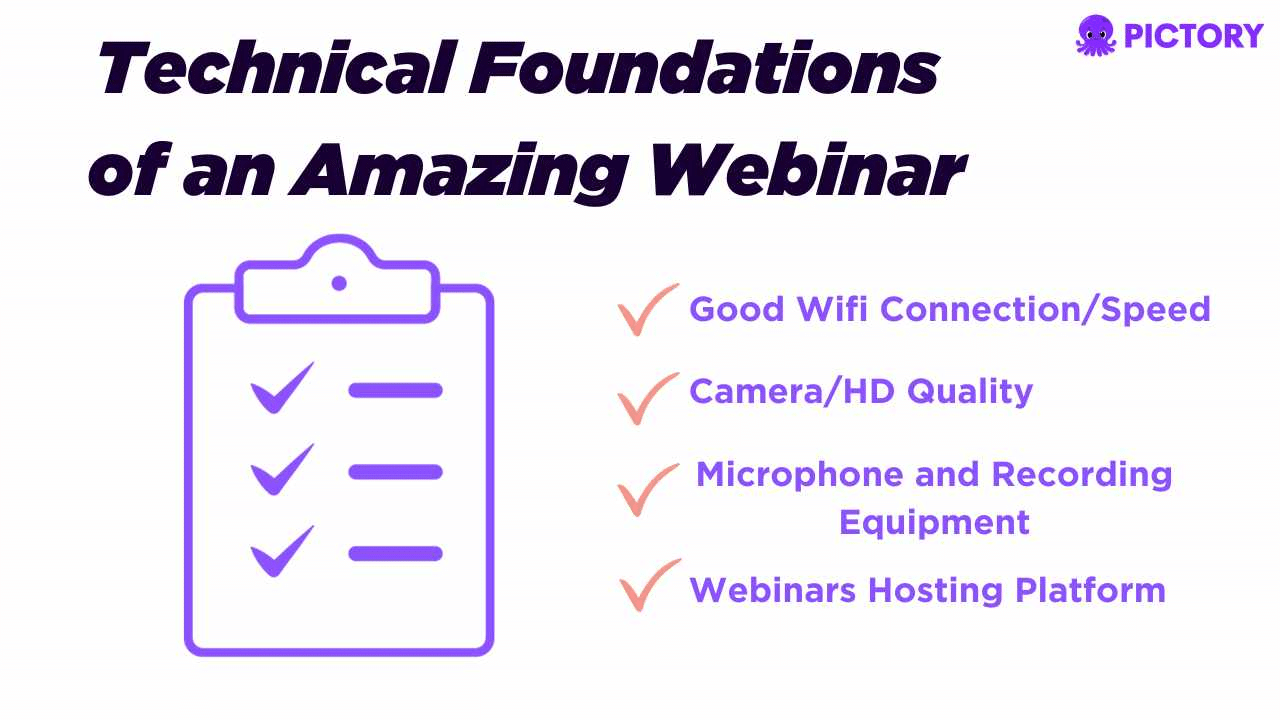
Having engaging content and speakers is a great first step to creating a webinar and one you shouldn’t overlook.
However, the technical elements are what enable you to deliver an impactful virtual event.
Your webinar platform, equipment, and production approach form the foundation for an excellent viewer experience.
Importance of High-Quality Video and Audio
Imagine attending a webinar where the video is pixelated.
Or the colors are washed out, and the audio cuts in and out.
Frustrating, right?
As an attendee, poor production value is a distraction that detracts from the actual content being presented.
It also means any content you create from your webinar going forward will have the same poor quality.
High-quality video and audio keep viewers focused on your speakers and slides, not troubleshooting technical issues on their end.
From a brand perspective, your webinar is a reflection of your professionalism.
Equipment Recommendations
Choosing the right webinar software and hardware is how you can do just that.
Here are key elements to have in place:
Webinar Platform
Webinars are hosted on specialized software that has everything you need to get started.
Look for key capabilities like polls, Q&As, screen sharing, and interactivity.
Popular options in the space include Demio, LiveWebinar, and ClickMeeting.
Most offer free trials, so test drive a few options to see which webinar solution best fits your needs.
You want the platform to feel invisible so you can focus on the webinar itself.
Hardware
For presenters: Don’t skimp on the technical elements.
Make sure your video output is HD resolution with crisp images and natural color balancing.
Presenters should have HD webcams to this effect.
Directional microphones also help minimize background noise.
For moderators: Consider having a multi-monitor setup.
This allows you to watch the presenter, see attendee questions, monitor chat, and handle behind-the-scenes logistics simultaneously on different screens.
The more you can juggle as the moderator, the smoother the webinar will run.
The Role of AI in Streamlining Webinar Production
Like many things in 2023, AI and automation can help streamline many aspects of webinar production.
Tools like ChatGPT allow you to describe your audience and goals.
You then generate a customized webinar script that matches.
Of course, you can always tailor it to maximize engagement.
AI can churn out pages in minutes for your review in seconds versus the hours it takes to manually write.
Then, AI transcription services can save vast amounts of time transcribing recordings after the webinar.
Automated subtitles and captions also make your content more accessible.
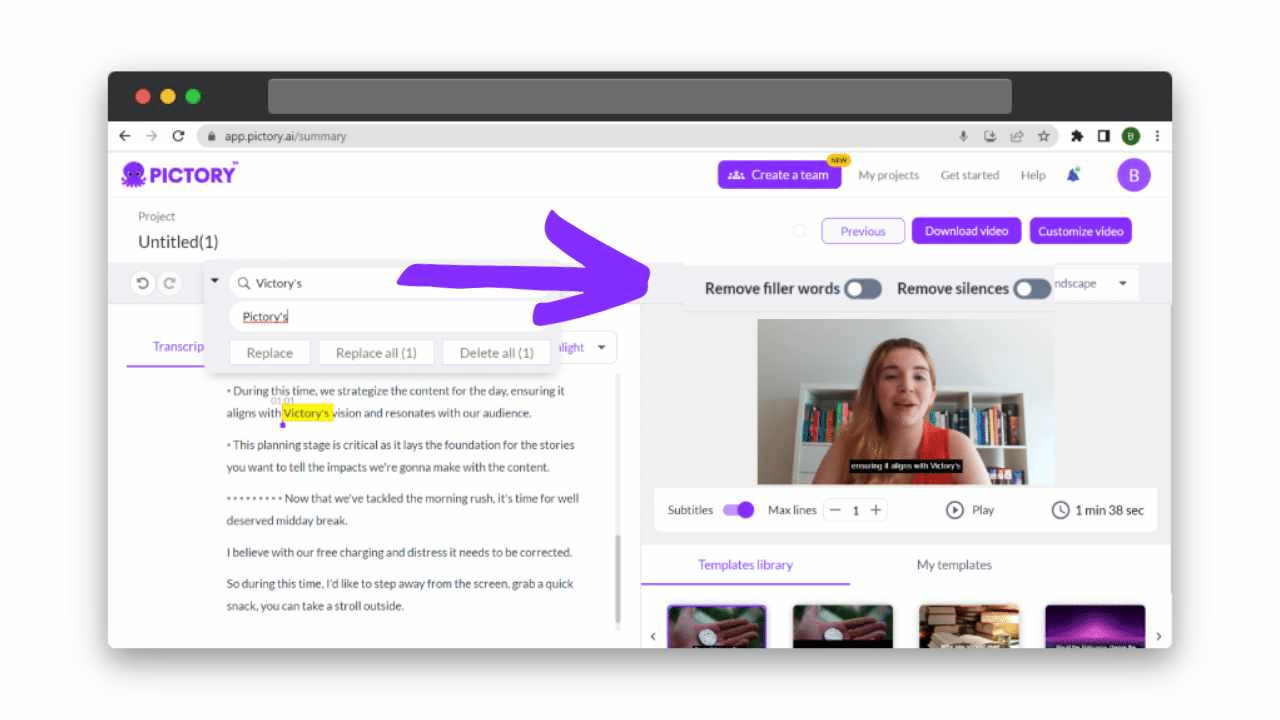
Video editing tools powered by AI (like Pictory) remove filler words and stitch together highlights seamlessly, reducing post-production webinar work.
Crafting and Preparing Your Successful Webinar Content
You have a new webinar platform lined up.
The tech setup is ready to rock.
Now comes the fun part – crafting killer webinar content that educates and entertains your audience!
This is your time to shine and demonstrate thought leadership.
Brainstorming and Choosing the Right Webinar Topic
First, tap into your audience’s deepest curiosities.
What are their most nagging questions?
Use surveys, interviews, and marketing tools like Google Trends to uncover pain points and unknowns. You really want to zero in on what keeps them up at night.
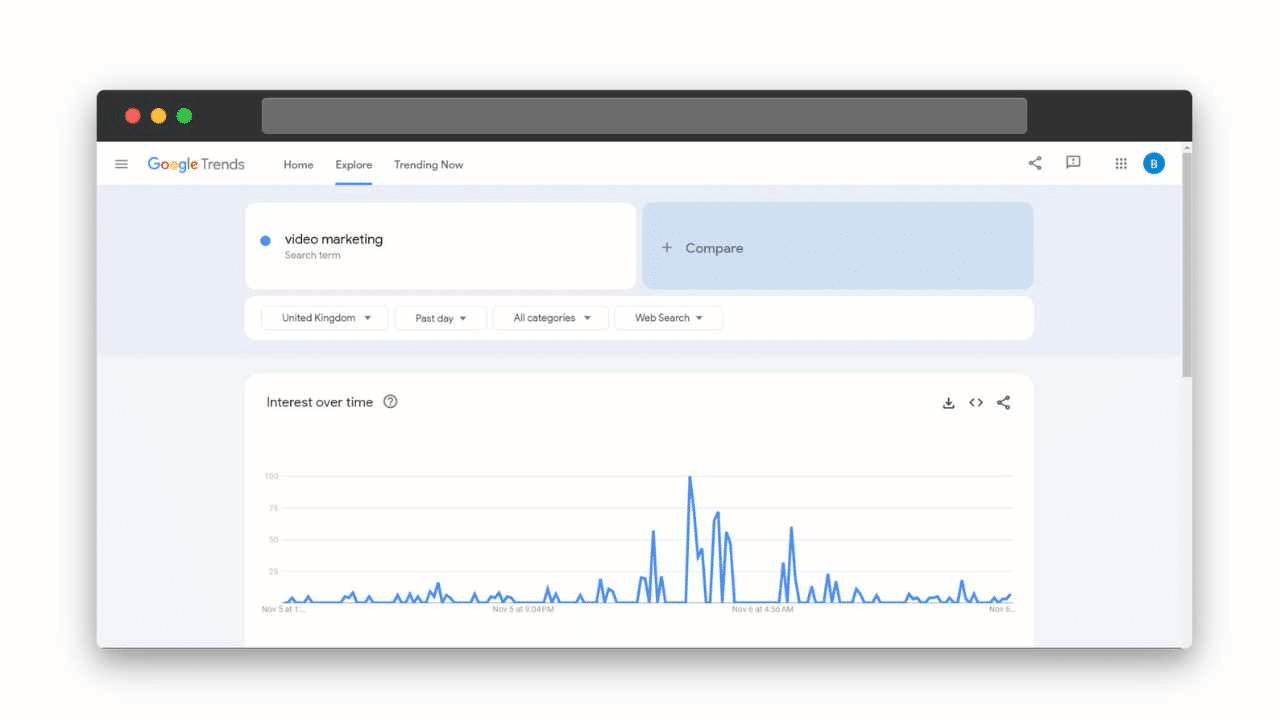
Then, outline the webinar’s story arc and key insights.
Like any good story, you want a beginning, middle, and end that leaves viewers well-informed yet hungry for more.
You also want to align the topic to your overarching content strategy.
Do you want to teach users how to get the most out of your product?
Or perhaps you’re looking to be respected in your industry as a thought leader who knows all the trends and hacks?
Either way, choose a topic that helps you meet these objectives.
Using AI Writing Tools for Webinar Scripts
Once you’ve chosen an undeniable topic, craft a script that hooks and holds attention.
Remember that most webinars run 45-60 minutes, so be intentional with your words.
This is the part where you can recruit AI screenwriters like ChatGPT.
Use it to write the first draft, then add your own flair, brand voice, and industry insights to take it up a notch.
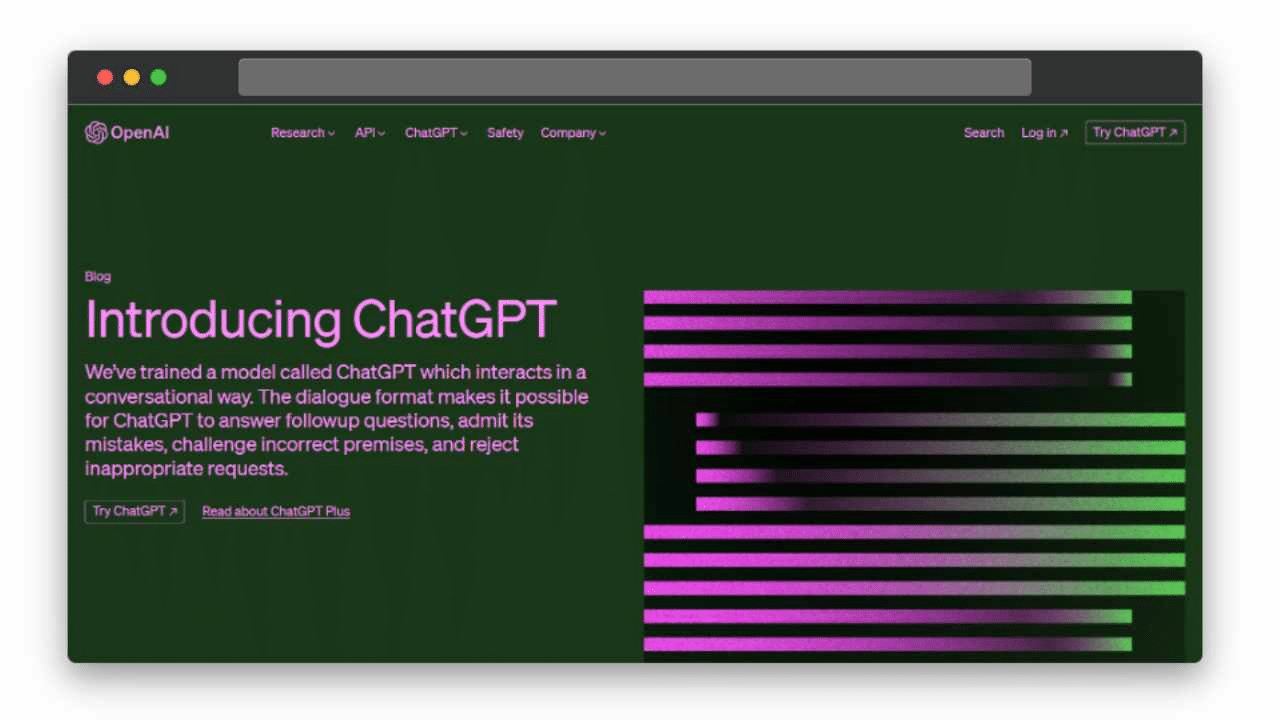
When writing, it’s always best to use conversational language.
Add a dash of humor.
Inject some storytelling techniques.
That’s the best way to make dry topics pop.
This is a presentation, not a blog post, and definitely not a whitepaper.
It should be written how one speaks as if they were standing in front of an audience delivering the presentation.
A good way to ensure your script sounds natural is simply to rehearse it out loud.
Record yourself and play it back to see if everything flows well.
Structure the script to include:
Engagement opportunities like polls and Q&As to actively involve viewers
Major reveal moments that showcase headline insights
Smooth scene transitions between points.
Sprinkle in shocking statistics, real-world examples, and cliffhangers to keep viewers glued to every minute of your presentation.
Scheduling and Advertising Your Webinar
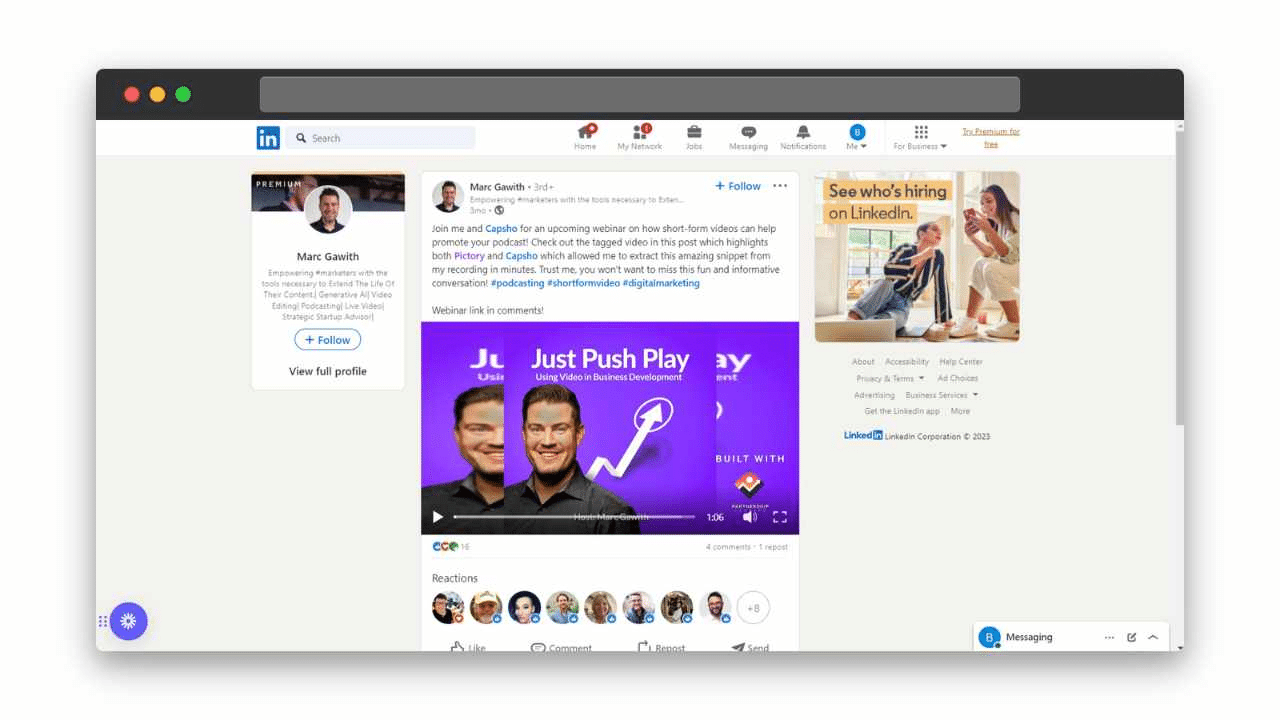
Of course, nobody wants to present to a screen full of ghosts.
Now is the time to generate interest for your webinar release date!
Ideally, you should schedule webinars one to two weeks in advance for optimal promotion.
Consider the lunch hour or early afternoon to maximize global attendance without disrupting work routines.
Promote webinars via:
Email sneak peeks
Paid ads targeting engaged personas
Personalized outreach to industry influencers
Paid promotions
A landing page
Release short teaser videos to build buzz
Explore other social media channels
This creates a content campaign within itself, funneling your content towards the webinar and then towards your business.
Visual Enhancements during Production with AI and Pictory
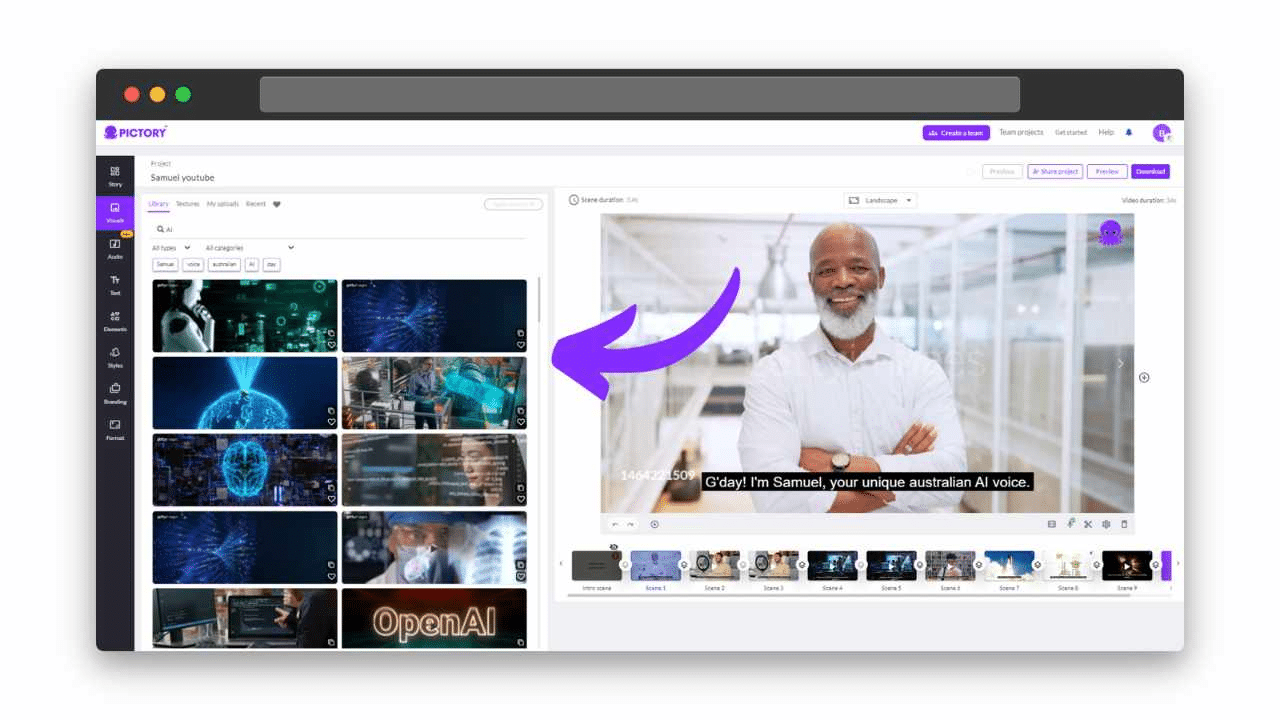
Visual elements can significantly enhance engagement and delivery.
Using tools like Pictory, you can integrate dynamic media to captivate audiences before, during, and after your webinar.
Visual Aesthetics in Webinar Engagement
It’s true that a successful webinar can deliver value through excellent speaking and subject matter expertise.
But compelling visuals take your content to the next level.
They also have the added benefit of improved information retention and comprehension.
You can use:
High-quality presentation slides with bold graphics, photos, and videos.
Graphics like flow charts and infographics clarify complex topics visually.
Videos and gifs to help convey stories dynamically.
Polls, quizzes, and interactive elements to get viewers to participate.
Make sure your webinar visual assets like logos, fonts, colors, and graphic styles align with your brand identity for a polished look.
Using Pictory for Video Enhancements
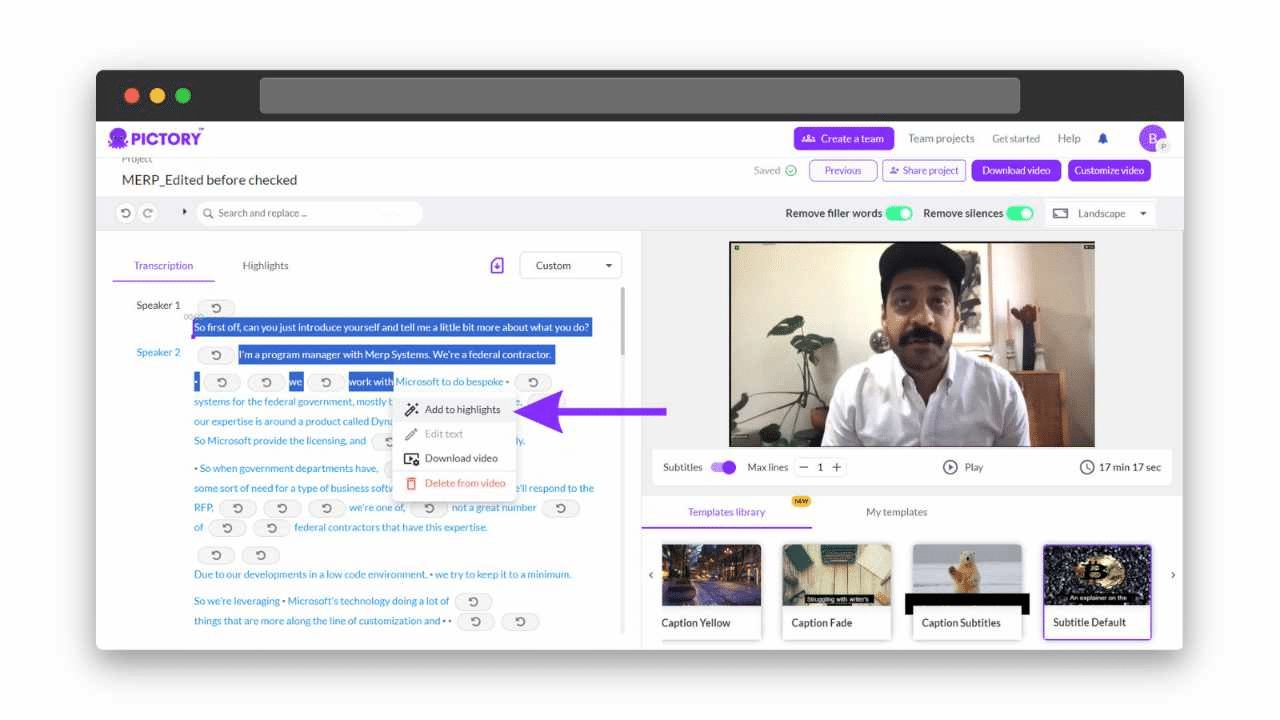
Pictory is an AI-powered video editing tool that can create video clips promoting your webinar content.
Editing long video footage into short marketing videos can take extensive effort.
Especially when you have to turn an hour-long webinar into a short snippet.
Pictory streamlines the repurposing of long recordings into short teasers and trailers.
Plus, they will be optimized for social platforms like Instagram and Twitter.
Our AI identifies engaging highlights and selects promotional clips.
Then, it stitches together a shareable teaser in minutes.
Hosting and Engaging With Your Webinar Audience
Now you’re presenting your webinar, but a great webinar isn’t just a one-way presentation.
It facilitates a lively dialogue with your audience.
Using interactive elements and moderators, you can spark meaningful audience engagement during the live webinar.
Real-Time Engagement
First, incorporate tools that enable audiences to contribute in real time.
Live polls and surveys make viewers an active part of shaping the webinar content.
Chat and Q&As give them voices to share perspectives.
Dedicate agenda time specifically for audience participation.
Rather than a non-stop presentation, incorporate discussion breaks to validate viewer opinions.
This makes the webinar feel like an inclusive exchange and increases value for a user.
To orchestrate this better engagement, appoint a moderator to guide the flow.
Like a producer behind the scenes, they compile questions, share top poll responses, highlight relevant comments, and filter noise.
This optimizes interactivity without disrupting speaker rhythm.
Addressing Audience Questions and Solutions
You should always prepare responses to common questions you anticipate.
Have a game plan for addressing key points of confusion or curiosity proactively during the webinar, wherever relevant linking to any service or solution your business provides.
Circle back to a dedicated Q&A section for deeper discussions as needed.
A tactful marketing team can adeptly pace exchanges to enrich, not encumber, the speakers.
The end result is webinar attendees who feel invested and satisfied, not just lectured one way.
Post-Webinar Activities and Repurposing Video Content
So, what can you do to keep the ball rolling post-webinar?
Promote your webinar.
Thoughtful follow-up and strategic content repurposing are the answers to cementing your webinar’s impact and maximizing its lasting influence.
Following Up with Your Audience
After you create a webinar, your goal is simple.
You want to continue building your online community.
Start by contacting attendees very soon after the webinar ends while it’s fresh in their minds.
Send a personalized thank you email recapping key insights they gained.
Another common practice is to include a link to the full webinar recording on demand and related downloadable resources.
That way, they can continue exploring the topics.
You might also want to delicately request feedback on the parts they found most valuable.
Doing so is a great way to gather input you can use to refine future webinars.
Transforming Webinars with Pictory
Creative repurposing of video content helps your webinar content enlighten audiences weeks, if not months or years after the webinar is finished.
It basically consists of segmenting the recording into short, consumable clips ideal for different social platforms.
You can:
Convert sections into blog posts or articles expanding on topics in more depth.
Upload full and truncated recordings to your website as gated offers or freely accessible thought leadership resources.
Generate teaser videos to promote the on-demand content and attract new viewers.
Create social media posts with key takeaways and engaging visuals.
Even after your live webinar concludes, you can continue leveraging the content visually with Pictory.
Turn the full-length webinar recording into shorter educational clips on specific topics to share on social media platforms.
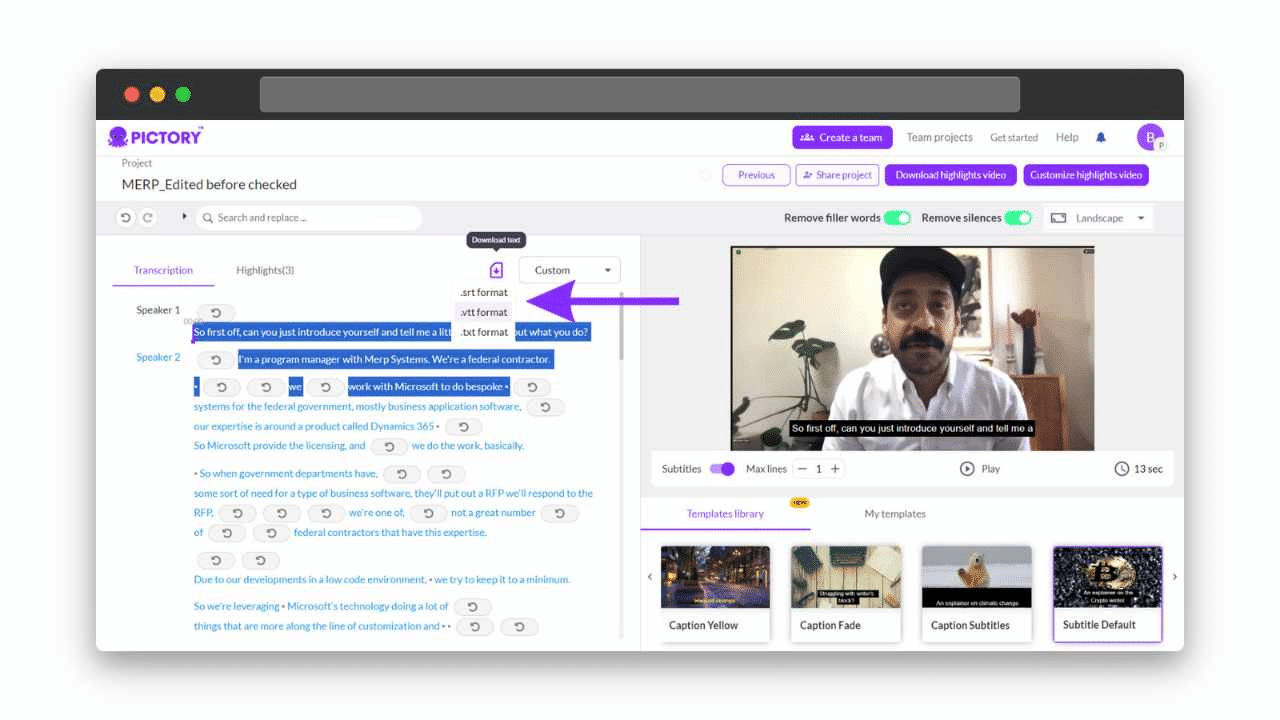
Or develop companion content expanding on key concepts from your webinar presentation.
Pictory will also auto-generate a full transcription of your webinar, ready to download as a script, perfect for turning into blogs or static social posts.
Measuring the Impact and Success of Your Webinar
Finally, we want to make sure all that hard work wasn’t in vain.
As the host, how can you gauge whether your webinar achieved its full potential?
Only analyzing key metrics will give you solid evidence of how your webinar performed.
Analyzing Engagement Metrics
Like any powerful speaker, your webinar aims to captivate and resonate with audiences.
Engagement metrics indicate if your content and delivery succeeded in holding your viewers’ attention.
Start by examining registration versus attendance rates.
What proportion of invites registered and attended live?
Then, review session duration against drop-off rates to see if interest was sustained from start to finish.
Depending on your initial goals, you may also use Google Analytics to look into website traffic around the webinar, landing page, email open and click rates, and survey feedback.
These provide useful perceptual data on your webinar’s impact.
Analyzing these metrics helps identify strengths to leverage again in the next webinar, as well as areas needing refinement.
ROI of Webinar Marketing
While engagement shows your webinar’s educational value, more data is needed to assess the monetary return.
That’s where ROI comes in.
Tally qualified leads captured, sales team inquiries generated, and revenue linked directly to the webinar.
You should also weigh harder-to-quantify benefits.
Think bolstered brand authority and mindshare growth.
Next, compare overall gains to webinar costs.
Although not the most expensive, you will have to pay for things like webinar software, promotion, and labor.
This gives you data to guide decisions on budget and focus for future webinars.
Prepare to Create your own Video Marketing Webinar
In summary, webinars are a powerful way to engage audiences.
They enable you to demonstrate industry expertise and drive meaningful results to marketing activity.
With the right preparation, you can host webinars that captivate viewers and become a core part of your digital marketing program.
As you integrate this interactive medium into your content creation calendar, be sure to leverage tools like Pictory to maximize your efficiency.
Want to get started? Sign up for a free trial or upgrade your Pictory plan today to start creating video highlights of your webinars and other marketing content.
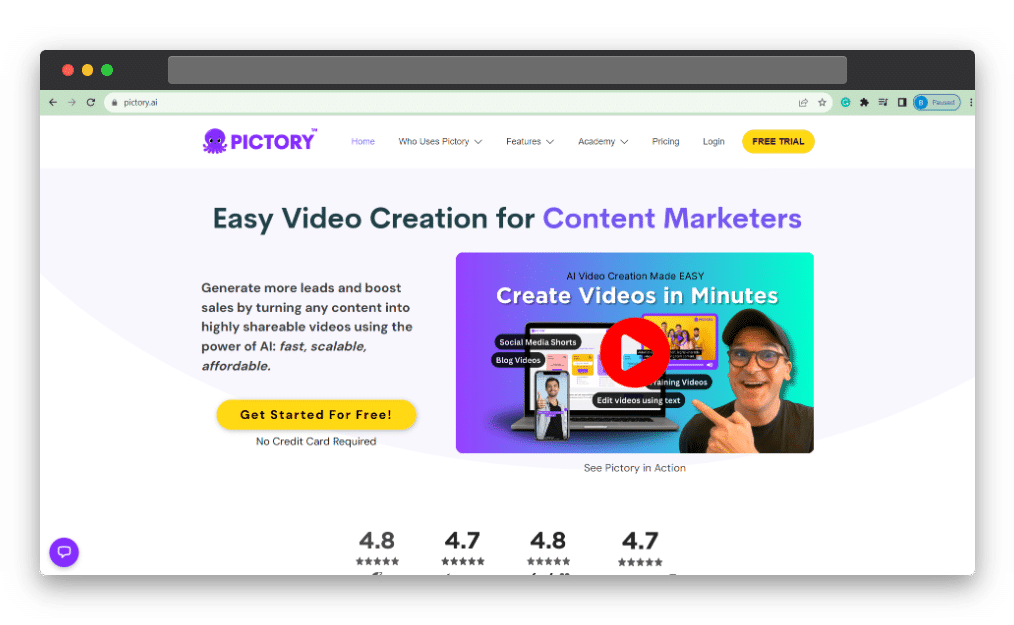
FAQs
What is a webinar, and how does it differ from other online events?
A webinar is a live event delivered through web conferencing software.
Viewers can tune in remotely using a link.
They differ from passive video streams by facilitating audience participation.
How can a webinar enhance my video content marketing strategy?
Hosting webinars provides a platform for showcasing video content in an interactive format.
They complement your other videos by delivering insights straight from experts.
Webinars also generate quality leads focused on your content.
What should I do with my video marketing webinar after it ends?
First, follow up with email campaigns to potential customers, recapping key points.
Repurpose your webinar content into social media clips, blog posts, and on-demand videos.
Upload full-length and highlight reels to extend your thought leadership reach.
Finally, continue nurturing lead generation efforts.

